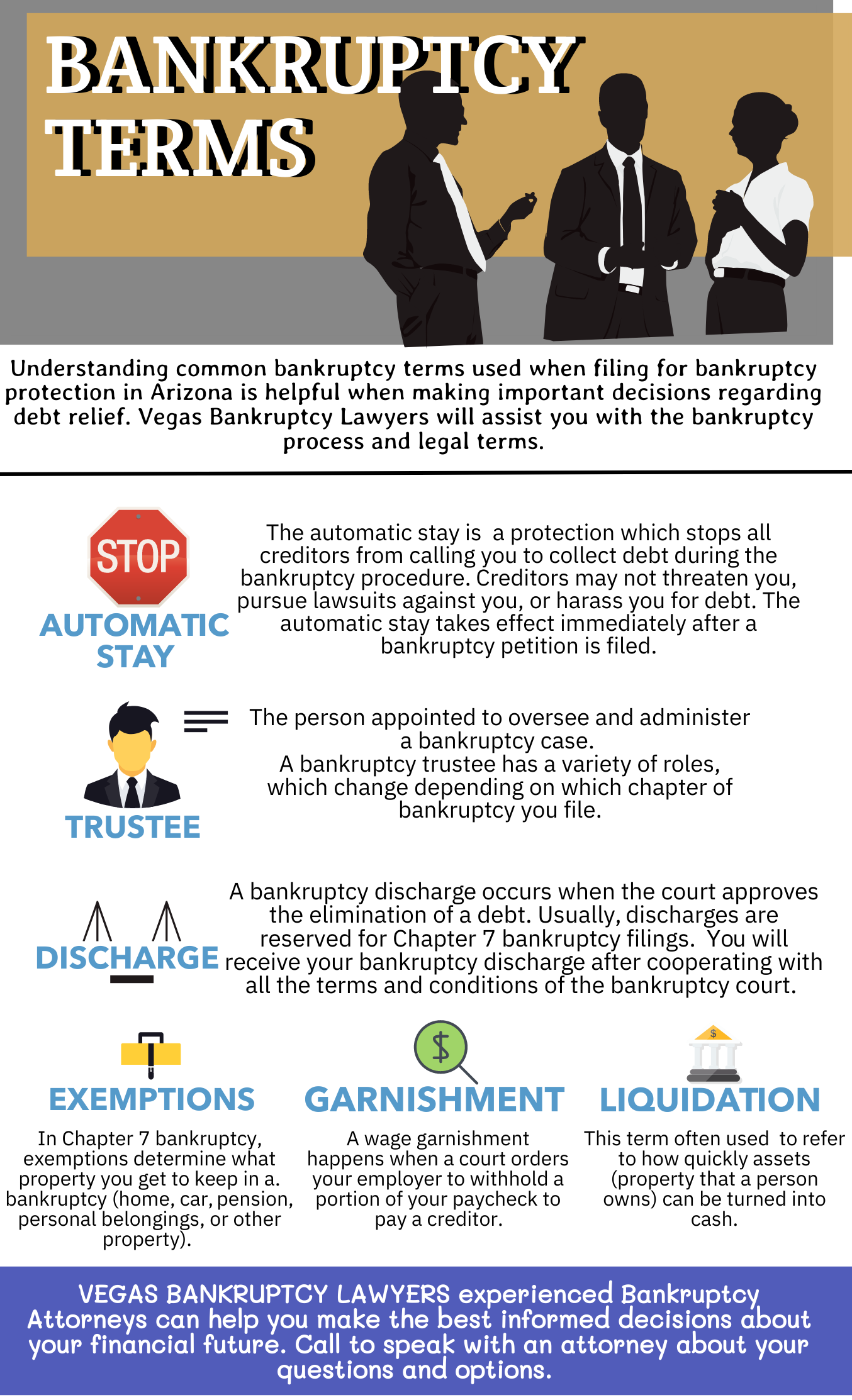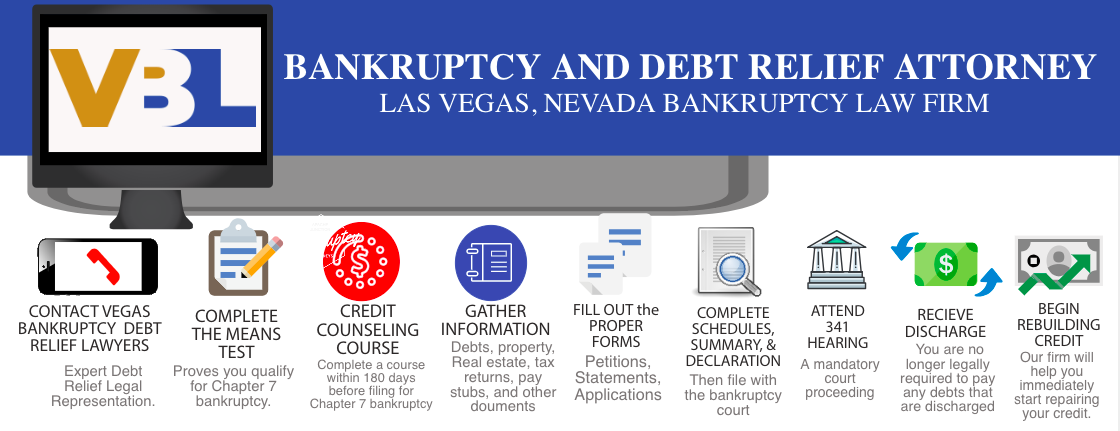COMMON BANKRUPTCY TERMS
FOR LAS VEGAS RESIDENTS FILING BANKRUPTCY

When filing for bankruptcy protection in Las Vegas, understanding several common bankruptcy terms will help you when communicating with Vegas Bankruptcy Lawyer legal staff. Below is information that will address many common bankruptcy terms and may prove helpful if you or a family member decide to seek the assistance of Vegas Bankruptcy Lawyer debt relief law firm.
Automatic Stay
Individuals filing for bankruptcy in Las Vegas are granted automatic stay the moment a petition is filed. This may be the most common concern about which our attorneys are asked by clients. Automatic stay is a protection which keeps all creditors from collecting a debt during the bankruptcy process. Any contact, including continuous or harassing phone calls from creditors must stop. Anyone who has been threatened with lawsuits or harassed by creditors will be protected from these threats during the automatic stay period. Also, automatic stay may stop a home foreclosure, a wage garnishment, or a repossession.
Bankruptcy Trustee
A bankruptcy trustee is the person appointed to oversee and administer a bankruptcy case. The bankruptcy trustee is someone appointed by the U.S. Department of Justice or by the creditors in a bankruptcy case to oversee the proceedings of the bankruptcy case. A bankruptcy trustee has a variety of roles, which change depending on which chapter of bankruptcy you file. The 2 most common types of bankruptcy are Chapter 7 and Chapter 13. The trustee is responsible for reviewing your bankruptcy petition, looking for fraud or any red flags and maximizing the amount of money your unsecured creditors will get through bankruptcy. Our Mesa bankruptcy lawyers will communicate on your behalf with the trustee.
Bankruptcy Discharge
When the Bankruptcy Court approves the elimination of a debt, a bankruptcy discharge is granted. This is the final step in the bankruptcy process, and normally discharges are assigned to Chapter 7 bankruptcy cases. After successfully fulfilling all the terms and conditions of the bankruptcy court, a debtor will be granted a bankruptcy discharge.
A bankruptcy discharge means the individual filing bankruptcy is not responsible for repayment of debt listed and indicated in the case.
Bankruptcy Exemptions
Exemptions are assets that the bankruptcy court cannot liquidate (sell or take) during a Chapter 7 bankruptcy case. If you are concerned about property or assets that you want to keep, consult with our experienced bankruptcy attorney about the specifics of your case.
Wage Garnishment
Wages are taken from a debtor’s income source and given to a creditor to repay a debt. When money is owed, a debtor may be ordered to repay the debt. If you owe money and your wages are garnished, they will be given directly to your creditor. Filing bankruptcy will stop most garnishments through the automatic stay. Wage garnishments can be tricky and should be taken seriously. Garnishing wages is one of the more common bankruptcy terms and also a frequent reason for individuals to declare bankruptcy.
Liquidation
Liquidation is usually linked with a chapter 7 bankruptcy filing. Bankruptcy liquidation is the sale of non-exempt items during a bankruptcy filing. In some cases, individuals are required to sell some of their valuables in order to use those profits to repay outstanding debts. In many Chapter 7 cases, though, liquidation is not an issue for filers who don’t have any non-exempt assets. Schedule a free consultation and debt evaluation with Vegas Bankruptcy Lawyers if you have questions about your assets and how they pertain to your specific bankruptcy case.
Means Test
Means test determines if a Las Vegas resident is eligible to file Chapter 7 bankruptcy protection. The Bankruptcy Act Means Test requires that your income and expenses be analyzed to determine if you qualify to file for a Chapter 7 bankruptcy (or if you should opt for a Chapter 13 filing). The court looks at your average income for the six months prior to filing, then compares this to the median income in the state of Nevada. If your income is below the Nevada median, you have the right to file for a Chapter 7. If your income exceeds the Nevada median, then the means test will determine that you can only file for a Chapter 13. Don’t forget, even if you do not qualify for Chapter 7, ,it is your right to be able to file for bankruptcy protection in Nevada. Vegas Bankruptcy Lawyers know the Nevada bankruptcy law, and will communicate your options for successful debt relief for your financial situation.
341 Hearing (a.k.a. Meeting of Creditors)
The meeting of creditors, or 341 Hearing, is a meeting appointed by the bankruptcy court which takes place during the bankruptcy process. At this meeting, any creditors affected by a bankruptcy filing are able to attend and oppose the bankruptcy if they see it necessary to do so. Some creditors won’t attend these meetings, but they have the opportunity as a party involved in the bankruptcy case to discuss any concerns that they may have. Our Vegas Bankruptcy Lawyers attorney will attend the 341 Meeting of Creditors with you and represent your case at the hearing.
Consolidating Debt
Debt consolidation is type of debt relief. In this option of debt relief, debts are combined when companies work on behalf of debtors by accepting a monthly payment from them. These companies split up the payment to their various creditors. Debt consolidation one of our common bankruptcy terms associated with debt relief options other than declaring bankruptcy. In theory, the method of consolidating debt provides the debtor with a more easily manageable way to pay their debts.
Repossession
A repossessed item is something that is reclaimed by a creditor. Often times, repossession occurs when a debtor fails to make payments on time. For example, if you default or stop payments on your car loan, your lender might repossess your car. Repossession can be stopped by filing for bankruptcy protection and is a common bankruptcy terms usually linked to vehicles, boats, motorcycles, RV’s, and other toys.













